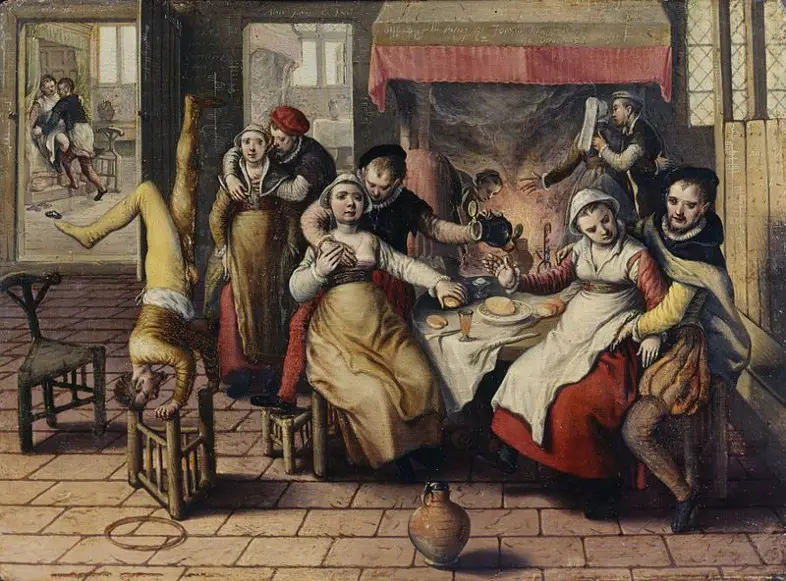 the late Middle Ages, the number of brothels reached an all-time high peak which helped grow the economy around the world because they maintained an activity that men could not give up. It is a historical taboo that has recently come to the attention of researchers. Sex with prostitutes is not an easy-to-talk-about-topic at all. It is quite infamous because, even today, there is no discussion about such a thing. It is another one of those topics that people are very well aware of but chooses not to speak about it.
the late Middle Ages, the number of brothels reached an all-time high peak which helped grow the economy around the world because they maintained an activity that men could not give up. It is a historical taboo that has recently come to the attention of researchers. Sex with prostitutes is not an easy-to-talk-about-topic at all. It is quite infamous because, even today, there is no discussion about such a thing. It is another one of those topics that people are very well aware of but chooses not to speak about it.
This is a very well-offered topic, as the medievalist Herm von Seggern from the University of Cologne, who in this case researched the history of sexuality from the late Middle Ages to the 16th century, shows us. He draws our attention to the fact that we are dealing with many parallels with the present. Prostitution is still taboo and, in many parts of the earth, still tolerated. The issue at hand can be seen from two different perspectives.
We are all to blame
The first issue is that women are allowing such businesses to go on as they tolerate the way men treat them as prostitutes. At the same time, we can view this from the perspective of how broken our society is, as more and more men see the need to use the services offered by prostitutes.
The legalization of prostitution is not a new topic of discussion either. The law that was adopted in Germany in this regard, for example, in 2002, is still viewed with suspicion. The idea was to formalize the sex business and improve working conditions in the field, but in reality, as reported by the authorities and associations, this was not the case because thousands of young women, especially in Eastern Europe, are lured and exploited by “businessmen” in Germany, and sex tourism is flourishing.
This is just history repeating itself, as it wasn’t much different about 1000 years ago. Men would search for exotic women and women from different parts of the world, so prostitution was a big part of the economy produced by tourism. Recently, the German government decided on an amendment to the law, which would restrict forced prostitution, but it is unknown how the situation will evolve.
Prostitution throughout history
In n the late Middle Ages, so the 14th-15th centuries, brothels were on the rise. City tolerance houses could be found in almost all major neighborhoods. They were officially accepted settlements, usually run by men, less often by women, and rents and taxes went to the cities. That is why prostitutes also appeared on city tax lists, such as the famous member of Hansa, Lübeck.
The sex being sold was, in a way, less evil. The almighty church tolerated the controversial occupation. In any case, unmarried men had no problems. In general, sexuality, which could not be openly expressed and experienced, was perceived as a danger to society. Therefore, since the time of the teachings of Blessed Augustine (354–430), prostitution was perceived as a necessary evil.
During the period of emancipation movements in the 1960s, an attempt was made to emphasize the victim status of women forced to resort to such occupations. Von Seggern draws our attention to the fact that men’s motivations and behaviors were less researched. The suitors of the Middle Ages are silent, which for gender studies is a real obstacle in creating a more comprehensive picture of the phenomenon.
Sources are problematic. Historiography is limited in terms of social history to individual-centered documents. Most of them are testimonies in which people of all kinds, including from lower social categories, provide information about themselves, more or less voluntarily. It can be court documents or personal memories.
An important source is, for example, the collection prepared by the jurist from Cologne named Hermann von Weinsberg. He tells us in about 2000 pages his experiences and visions about life, briefly mentioning his visits to the houses of tolerance. He tells us, for example, that he lost his virginity in such a place, and after that, he kept going to brothels, always associating sex with drunkenness, fun, and socializing.
The social point of view
Speaking of socialization, Weinsberg also tells us that, like many others, he felt very pressured by the prevailing attitudes at the time. Many men spoke very openly and shamelessly about their extraordinary audacity to break down social and moral barriers, living all kinds of sexual experiences. The clergy did not let themselves be outdone either, resisting the temptation and sinning repeatedly.
The historian von Seggern also draws our attention to the existence of true peer pressure among young people, who compare each other and valued and praised each other, creating an almost heroic aura. There was pressure from the confreres pushing for the exploration of sexuality to the point that not going to a brothel was considered taboo.
Behind it lies a question: “What does a real man mean?” The answer is related to what we mean by chivalry and the chivalrous virtues of the Middle Ages, a masculine culture that ultimately has more of an ideational and mythical level. It is not easy to determine which male image dominates the landscape because it is difficult to generalize due to the precariousness of historical sources. Finally, beyond the models, there is a wide range of individualities.
However, the basic idea is that the Middle Ages were not as dark and opposite to pleasures as we often hear, and sexuality should be viewed in a way that is as pragmatic as possible to understand its various reasons. After all, we are not so far from the people of those times. Sex, for money or not, has always been a common reality, even if taboos imposed silence on such a subject.
Avid Writer with invaluable knowledge of Humanity!
Upcoming historian with over 30 million views online.
“You make your own life.”





